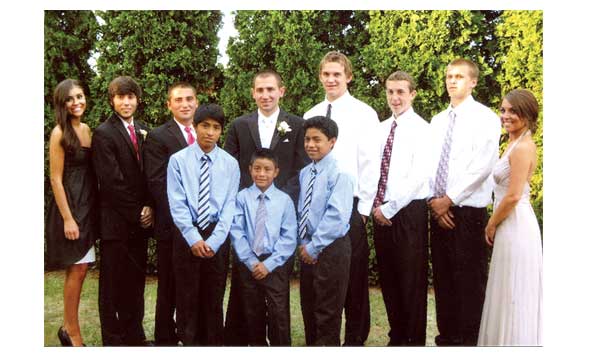
Why do bad things happen to good people?
It’s a question that has plagued mankind since our earliest days, and we have yet to find a satisfying answer. It’s a question that comes to mind when considering Gregg ’87 and Mary Jo ’87 Loboda, a couple who raised one biological child alongside 10 adopted children from around the world, who found their lives sent into a tailspin when Gregg began suffering from Lyme disease more than two years ago.
“Lyme disease itself is terrible . . . but the toll it takes on a family — in getting doctors to believe it’s Lyme or insurance to be willing to cover treatments — doubles the hardship,” said Mary Jo. “That experience afforded us the opportunity to grow and deepen our faith in ways we didn’t anticipate.
“(We’re) confident that our suffering has made us better people and has brought greater glory to God.”
Gregg and Mary Jo began dating while they were resident advisers at Scranton. As one of the four founding members of the lacrosse team, Gregg made a lasting impact on the University that echoes to this day. The two became engaged their senior year and were married shortly after graduation by the Rev. John J. Begley, S.J., who had taught the couple a course on love and marriage at the University.
“The University helped shape us as much as our parents did,” said Mary Jo.
After college, Gregg began working at Prudential, eventually rising to the level of vice president of Information Systems, while Mary Jo worked as a graphic designer. With the birth of their biological son, John, they became the embodiment of the nuclear family, but that soon changed. Over a span of several years, they adopted seven Russian children (Sergei, Dimitri, Julia ’11, Roma, Katia, Denis and James) and three Guatemalan siblings (Luis, Juan and Higinio) after extraordinary circumstances brought them into the Lobodas’ lives and hearts. Despite challenges, such as language barriers and cultural differences, life was good.
“We never second-guessed our hearts, but we were always smart enough to think through the challenges,” said Gregg. “We just made things work.”
Things took a turn for the worse when Gregg began experiencing frightening symptoms about two years ago.
“Suicidal ideation. Brain inflammation. Arthritis. Kidney degradation. Severe depression,” he said. “(For) one day, I was paralyzed.” Gregg’s doctors, who believed the cause was neurological, began to treat his symptoms.
After months of disappointment, they informed the family that he wasn’t making any progress. The Lobodas put their nine-bedroom, eight-bathroom home in Waverly, which Gregg had spent years restoring, on the market and moved to a smaller residence in Mary Jo’s hometown.
“I cried every day for a year and a half,” said Mary Jo. “Although there was great support from family and friends, I truly felt alone.”
One bad day served as the springboard for the renewal of Mary Jo’s faith. During a cold snap, she asked one of her sons to run water in the furnace of the Waverly residence to prevent it from freezing, and he accidentally flooded the house. While waiting for the insurance adjuster, Mary Jo received an email from her car insurance carrier informing her they were about to terminate her policy unless she installed a tracker in her vehicle. She asked the same son to install the equipment in her car and wondered how she was ever going to get through it all.
Then, she hit a deer with her car.
That evening, it occurred to her that, had the house not flooded, she would not have checked her email, would have lost her car insurance and would have had to pay for the accident’s damages out-of-pocket. For the first time in a long time, she felt the hand of God in her life.
“From that day on, I was completely confident,” she said. “My car got fixed — it was like new. The house got fixed with the insurance money and all the hardwood floors got refinished.
“It was like I needed to see through the lens of faith and not the earthly lens I was used to using.”
Around the same time, a family member noticed something curious about Gregg’s symptoms that his doctors had missed: They matched up with many of the symptoms of Lyme disease. Sure enough, Gregg tested positive and adjusted his treatment course.
“That started us on a whole different path,” Mary Jo said. “It gave us a lot of hope.”
Over time, Gregg’s symptoms improved dramatically. Today, he and his family continue to recover from the ordeal, taking comfort in their faith and the support they continue to receive from family and friends.
“Hearing people tell you that you’re on a prayer chain — it sounds like something more powerful than any medical advancement,” said Gregg.
“I don’t know what I would do if I didn’t have faith,” said Mary Jo. “I think we’re going to come out of this on the other side much stronger than we ever would have been if things had just tooled along.”


